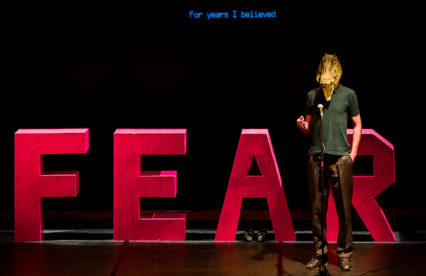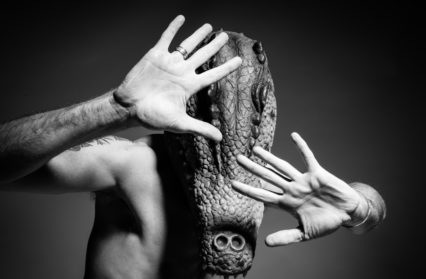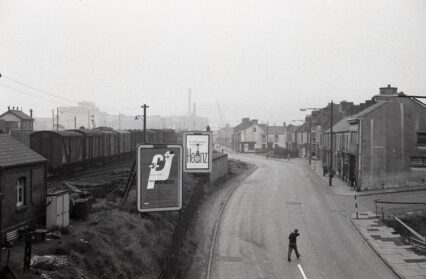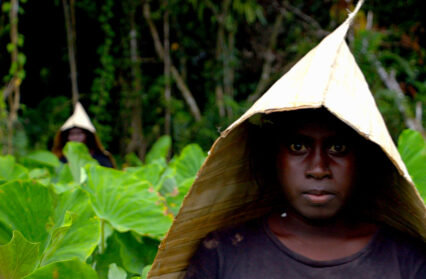What is it to be in constant Fear? A fear which cripples? Places metaphorical invisible chains that twist around one’s body? A fear which is personified in an omnipresent figure which hangs over you whilst you walk down the street. In (F.E.A.R) Gareth Clark, one half of the experimental, transgressive performance duo The Clarks, attempts to address his Fear, a fear which has haunted him since childhood.
This piece follows their Amnesty International Award-nominated show Smash It Up which toured nationally in 2016. In (F.E.A.R) the autobiographical self confronts the traumatic and the ever-so-relevant political reality of today, the popular news of Islamic State attacks, the revelations of whistleblower Edward Snowden, and the rise of UKIP, as well as the growing concern of physical ageing in men.
The fear looms over the audience in huge red letters reminiscent of the Hollywood sign, big bold red letters warning the audience that what will follow will be dark and powerful.
Watching Clark transform from an insidious Crocodile hybrid to a child resonates; he’s the monster under the bed with its uncanny grin ready to gobble you up. A monster which viewed through the eyes of an adult is comedic and playful but to a child is the epitome of constant danger.
 Drawing the audience in to a place of intimacy, Clark transports us back to his Welsh upbringing in Newport an upbringing of homophobic taunts, heteronormativity and rituals of cleanliness. Repetitions of masculinity are exposed as sad attempts to gain control over those who aren’t white and straight. This fear of what is different and therefore odd plagues the show’s dialogue, Clark’s confessional rants. The audience become witnesses to what Sigmund Freud called a ‘talking cure’. Clark is getting it all off his chest, a confession which he culminates in an almost ritualistic shaking, a pulsating dance which is full of animalistic fear.
Drawing the audience in to a place of intimacy, Clark transports us back to his Welsh upbringing in Newport an upbringing of homophobic taunts, heteronormativity and rituals of cleanliness. Repetitions of masculinity are exposed as sad attempts to gain control over those who aren’t white and straight. This fear of what is different and therefore odd plagues the show’s dialogue, Clark’s confessional rants. The audience become witnesses to what Sigmund Freud called a ‘talking cure’. Clark is getting it all off his chest, a confession which he culminates in an almost ritualistic shaking, a pulsating dance which is full of animalistic fear.
A powerful visual within the piece comes from Clark’s need for transcendence, an escapism form the 9 to 5; his place of worship was not the church – ‘a scary austere place’ – but the disco hall of the 1980’s. Clark’s dancing is jerky, a struggle and a joy to watch. It’s an active resistance to the chains of daily living, and the mundane future which is placed upon a person in early adulthood. Credit scoring, mortgages, salaries and normative sex which is monitored by family and friends.
The question of cleanliness strikes a powerful chord. Clark addresses those nightmarish, heart-stopping moments of panic concerning bits in the teeth, stains on the jumper or even more fear inducing ‘toilet stains’. To be dirty is to be bad. It is to be unclean and a figure for ridicule. To be clean or dirty are both modes in which we can be placed in society. Being dirty can demonstrate who is to be cast off, left outside. It’s a very common concept, the idea of the abject. The abject is a complex psychological, philosophical and linguistic concept developed by Julia Kristeva in her 1980 book Powers of Horror. If something or someone is abject they threaten and transgress order and regulation. Seen as outsiders, and therefore odd. Abjection is used to describe the state of often-marginalized groups, such as women, unwed mothers, people of minority religious faiths, prostitutes, convicts, poor, LGBTQ and disabled people. It was a smart move silently referencing this, especially juxtaposed with Clark’s anxieties of the far right.
(F.E.A.R) is a firework of fragmented story telling, black humour, ranting and soul-searching. The audience played an integral role. This was a piece about watching, a voyeur to a stream of consciousness that had to be expressed.
For Mr and Mrs Clark tour dates visit here












